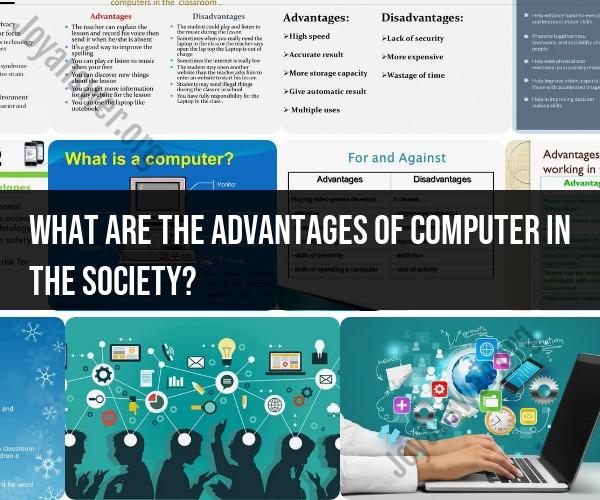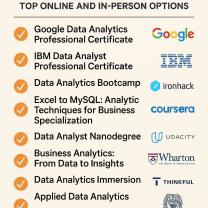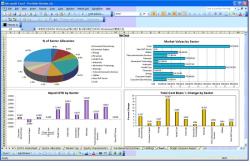What are the advantages of computer in the Society?
Computers have had a profound impact on society, bringing about a wide range of advantages and benefits that have transformed various aspects of our daily lives. Here are some of the key advantages of computers in society:
Improved Efficiency: Computers can process data and perform tasks at speeds far surpassing human capabilities. This has led to increased efficiency in various fields, from manufacturing to data analysis.
Information Access: The internet and computer technology have made it easier for people to access vast amounts of information, facilitating research, education, and knowledge-sharing.
Communication: Computers and the internet have revolutionized communication. Email, instant messaging, social media, and video conferencing enable people to connect and communicate globally in real time.
Automation: Computers have automated many manual and repetitive tasks, reducing human labor and minimizing the risk of errors. This has improved productivity in industries like manufacturing, logistics, and finance.
Data Storage and Retrieval: Computers have made it possible to store, organize, and retrieve vast amounts of data efficiently. This has eliminated the need for extensive physical record-keeping and storage space.
Entertainment and Media: Computers have transformed the entertainment industry. They have enabled the creation and distribution of digital media, including music, movies, video games, and streaming services.
E-commerce: Online shopping and e-commerce have become prevalent, offering consumers a convenient way to purchase goods and services from the comfort of their homes.
Education: Computers and the internet have revolutionized education, making it possible for students to access online courses, resources, and educational tools. They have also facilitated remote learning.
Research and Science: Computers are essential tools in scientific research, data analysis, simulations, and modeling. They have accelerated scientific discoveries and advancements in various fields.
Healthcare: Computers are used in medical diagnosis, treatment planning, and patient record management. They have improved patient care, medical research, and administrative efficiency in healthcare institutions.
Business and Finance: Computers are crucial for businesses, supporting accounting, financial analysis, inventory management, and customer relationship management. They enhance decision-making and resource allocation.
Global Connectivity: The internet, enabled by computer technology, has connected people and businesses worldwide. This global connectivity has facilitated cross-border trade, international cooperation, and cultural exchange.
Environmental Monitoring: Computers are used in environmental monitoring and modeling, helping to study climate change, air quality, and ecosystem health.
Sustainability: Computers are employed in sustainable practices, such as energy management, waste reduction, and efficient transportation systems.
Disaster Management: Computers play a vital role in disaster prediction, preparedness, and response. They help with early warning systems and crisis management.
Social Impact: Computers have connected individuals and communities, enabling social networking, activism, and online support networks.
Creativity and Art: Computers support digital art, graphic design, music production, and creative expression through software and multimedia tools.
Personal Productivity: Computers and software applications enhance personal productivity, including time management, organization, and collaboration.
It's important to note that while computers offer numerous advantages, there are also concerns and challenges, such as privacy and security issues, the digital divide, and the potential for job displacement due to automation. Society must address these challenges while continuing to leverage the benefits of computer technology.
The Advantages of Computers in Society
Computers have had a profound impact on society, offering a wide range of advantages, including:
- Increased productivity: Computers can automate many tasks that are time-consuming and repetitive, freeing up people to focus on more complex and value-added activities.
- Improved communication and collaboration: Computers have made it easier than ever to communicate and collaborate with people from all over the world. This has led to new opportunities for businesses, educational institutions, and other organizations.
- Access to information and knowledge: Computers provide access to a vast amount of information and knowledge, which can be used for a variety of purposes, such as learning, research, and entertainment.
- Enhanced decision-making: Computers can help people make better decisions by providing them with access to data and analytics tools.
- New products and services: Computers have enabled the development of new products and services, such as e-commerce, online banking, and social media.
Computer Technology and Its Transformative Impact
Computer technology has had a transformative impact on society, touching virtually every aspect of our lives. Here are a few examples:
- Education: Computers are used in schools and universities to teach students a wide range of subjects, from math and science to history and language arts. Students can also use computers to access educational resources online and to collaborate with their classmates on projects.
- Healthcare: Computers are used in hospitals and clinics to diagnose and treat patients, to conduct research, and to manage patient records. Computers also enable doctors to consult with colleagues and to access medical information from around the world.
- Business: Computers are used in businesses of all sizes to automate tasks, improve communication and collaboration, and make better decisions. Computers also enable businesses to reach new customers and markets through e-commerce and other online platforms.
- Government: Computers are used by government agencies to provide services to citizens, to manage infrastructure, and to improve security. Computers also enable citizens to interact with the government online and to participate in the democratic process.
Applications of Computers in Various Sectors
Computers are used in a wide range of sectors, including:
- Education: Computers are used to teach students a wide range of subjects, to provide access to educational resources, and to enable collaboration among students and teachers.
- Healthcare: Computers are used to diagnose and treat patients, to conduct research, and to manage patient records.
- Business: Computers are used to automate tasks, improve communication and collaboration, and make better decisions.
- Government: Computers are used to provide services to citizens, to manage infrastructure, and to improve security.
- Finance: Computers are used to process financial transactions, to manage risk, and to provide investment advice.
- Manufacturing: Computers are used to design and manufacture products, to manage inventory, and to improve efficiency.
- Retail: Computers are used to manage inventory, to process customer orders, and to provide customer service.
- Transportation: Computers are used to manage traffic, to schedule flights and trains, and to provide navigation services.
- Media and entertainment: Computers are used to produce and distribute movies, music, video games, and other forms of media and entertainment.
Addressing Societal Challenges Through Computing
Computers can also be used to address a variety of societal challenges, such as:
- Climate change: Computers can be used to model the effects of climate change and to develop solutions to mitigate its impact.
- Poverty: Computers can be used to provide access to financial services, education, and other resources to people in poverty.
- Disease: Computers can be used to develop new drugs and treatments for diseases, to track the spread of diseases, and to provide healthcare to people in remote areas.
- Education: Computers can be used to provide access to quality education to people in all parts of the world.
The Future Role of Computers in Society
Computers are likely to play an even greater role in society in the future. As computers become more powerful and affordable, they will be used in new and innovative ways. For example, computers could be used to:
- Create personalized learning experiences for students
- Develop new medical treatments and diagnostic tools
- Automate tasks that are currently performed by humans
- Create new forms of art and entertainment
- Enable new forms of communication and collaboration
Computers have the potential to make the world a better place, but it is important to use them responsibly and ethically. We need to ensure that everyone has access to computers and that computers are used to benefit all of society.













